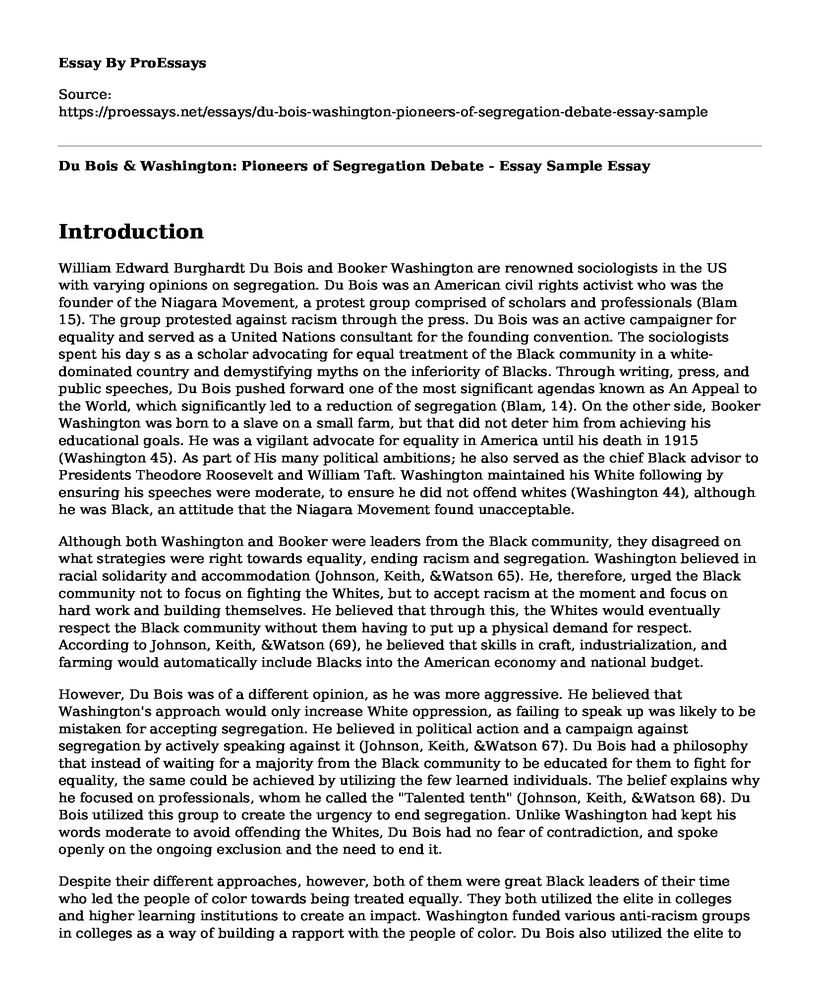Introduction
William Edward Burghardt Du Bois and Booker Washington are renowned sociologists in the US with varying opinions on segregation. Du Bois was an American civil rights activist who was the founder of the Niagara Movement, a protest group comprised of scholars and professionals (Blam 15). The group protested against racism through the press. Du Bois was an active campaigner for equality and served as a United Nations consultant for the founding convention. The sociologists spent his day s as a scholar advocating for equal treatment of the Black community in a white-dominated country and demystifying myths on the inferiority of Blacks. Through writing, press, and public speeches, Du Bois pushed forward one of the most significant agendas known as An Appeal to the World, which significantly led to a reduction of segregation (Blam, 14). On the other side, Booker Washington was born to a slave on a small farm, but that did not deter him from achieving his educational goals. He was a vigilant advocate for equality in America until his death in 1915 (Washington 45). As part of His many political ambitions; he also served as the chief Black advisor to Presidents Theodore Roosevelt and William Taft. Washington maintained his White following by ensuring his speeches were moderate, to ensure he did not offend whites (Washington 44), although he was Black, an attitude that the Niagara Movement found unacceptable.
Although both Washington and Booker were leaders from the Black community, they disagreed on what strategies were right towards equality, ending racism and segregation. Washington believed in racial solidarity and accommodation (Johnson, Keith, &Watson 65). He, therefore, urged the Black community not to focus on fighting the Whites, but to accept racism at the moment and focus on hard work and building themselves. He believed that through this, the Whites would eventually respect the Black community without them having to put up a physical demand for respect. According to Johnson, Keith, &Watson (69), he believed that skills in craft, industrialization, and farming would automatically include Blacks into the American economy and national budget.
However, Du Bois was of a different opinion, as he was more aggressive. He believed that Washington's approach would only increase White oppression, as failing to speak up was likely to be mistaken for accepting segregation. He believed in political action and a campaign against segregation by actively speaking against it (Johnson, Keith, &Watson 67). Du Bois had a philosophy that instead of waiting for a majority from the Black community to be educated for them to fight for equality, the same could be achieved by utilizing the few learned individuals. The belief explains why he focused on professionals, whom he called the "Talented tenth" (Johnson, Keith, &Watson 68). Du Bois utilized this group to create the urgency to end segregation. Unlike Washington had kept his words moderate to avoid offending the Whites, Du Bois had no fear of contradiction, and spoke openly on the ongoing exclusion and the need to end it.
Despite their different approaches, however, both of them were great Black leaders of their time who led the people of color towards being treated equally. They both utilized the elite in colleges and higher learning institutions to create an impact. Washington funded various anti-racism groups in colleges as a way of building a rapport with the people of color. Du Bois also utilized the elite to pressure the government to end segregation.
Although they differed in their approach to segregation, both Washington and Du Bois played a significant role in ending discrimination during their time. Their efforts paved the way for other sociologists and human activists to fight for equal treatment of Whites and Blacks. Together, they showed the power of education in achieving equality.
Works Cited
Blum, Edward J. WEB Du Bois, American Prophet. University of Pennsylvania Press, (2009):12-16
Johnson, Keith V., and Elwood Watson. "The WEB Du Bois and Booker T. Washington Debate: Effects upon African American Roles in Engineering and Engineering Technology." Journal of Technology Studies 30.4 (2014): 65-70.
Washington, Booker T. Up from slavery: With related documents. Macmillan Higher Education, (2019):43-47
Cite this page
Du Bois & Washington: Pioneers of Segregation Debate - Essay Sample. (2023, Feb 24). Retrieved from https://proessays.net/essays/du-bois-washington-pioneers-of-segregation-debate-essay-sample
If you are the original author of this essay and no longer wish to have it published on the ProEssays website, please click below to request its removal:
- Coursework Example: Institutional Policy Analysis
- History of US Law Enforcement Essay
- GDP and Standards of Living Between Germany and Indonesia - Research Paper
- Essay Sample on Nationalism in the Former Yugoslavia
- Canada's Democracy: Stable Traditions, Varied Opinions, Political Parties - Essay Sample
- Essay Sample on Barak Obama's ACA: Wider Access to Healthcare or Controversy?
- Trump Immigration: Resistance to Deportation & Public Concern - Essay Sample







